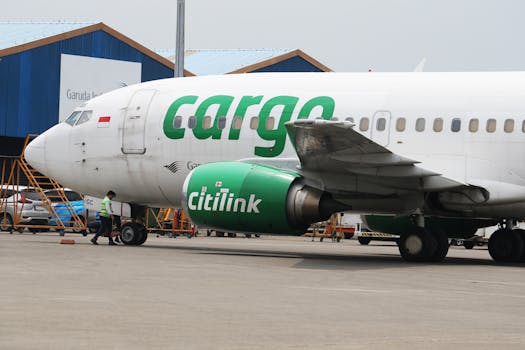
In a city that never sleeps, Lagos’s air freight industry pulses with energy 24/7, moving billions of dollars worth of cargo through its bustling airports. Yet, many businesses struggle to navigate this complex logistics landscape, often facing delays, unexpected costs, and regulatory hurdles that impact their bottom line. ️
Whether you’re a seasoned importer/exporter or just starting to explore air freight options in Nigeria’s commercial hub, understanding the intricacies of Lagos’s air cargo ecosystem is crucial for success. From choosing the right service type to leveraging cutting-edge technology, every decision can significantly impact your shipping efficiency and costs.
In this comprehensive guide, we’ll dive deep into the heart of Lagos’s air freight services, exploring everything from market dynamics and regulatory requirements to practical solutions for common challenges. Let’s unpack the essential elements that will help you master air freight logistics in Africa’s largest metropolis.

Current Market Size and Growth Potential
Lagos air freight market currently handles over 80% of Nigeria’s air cargo traffic, processing approximately 200,000 metric tons annually. The market is experiencing a 15% year-over-year growth, driven by e-commerce expansion and increasing international trade relations.
Key Players and Service Providers
-
Major International Carriers
-
Emirates
-
Sky Cargo
-
Turkish Cargo
-
Ethiopian Airlines Cargo
-
DHL Aviation
-
-
Local Operators
-
Allied Air
-
Arik Air Cargo
-
Air Peace Cargo
-
Major Air Cargo Terminals
| Terminal | Capacity (MT/year) | Specialization |
|---|---|---|
| SAHCO Shed | 100,000 | General Cargo |
| NAHCO Terminal | 150,000 | Perishables |
| DHL Terminal | 50,000 | Express Freight |
Import/Export Statistics
The Lagos air freight market shows a distinct trade pattern:
-
Imports (65% of total volume)
-
Electronics and tech equipment
-
Pharmaceutical products
-
Machinery parts
-
-
Exports (35% of total volume)
-
Agricultural products
-
Textiles
-
Manufactured goods
-
Growth in the e-commerce sector and increasing demand for time-sensitive deliveries are reshaping the market dynamics. The Murtala Muhammed International Airport serves as the primary hub, connecting Lagos to over 40 international destinations. With the implementation of the African Continental Free Trade Agreement, the market is positioned for significant expansion in regional trade activities.
Now, let’s examine the various types of air freight services available in Lagos to better understand how these market dynamics translate into practical shipping solutions.

Types of Air Freight Services Available
Express Air Freight
Express air freight offers the fastest shipping solution in Lagos, typically delivering within 1-3 business days. This service is ideal for time-critical shipments and high-value goods requiring urgent delivery.
Consolidated Shipping
This cost-effective option combines multiple shipments from different customers into one consolidated load. It’s perfect for businesses with smaller cargo volumes looking to reduce costs.
Charter Services
Charter services provide dedicated aircraft for specialized shipping needs, offering maximum flexibility and control over shipping schedules.
| Charter Type | Best For | Typical Lead Time |
|---|---|---|
| Full Charter | Large volumes | 24-48 hours |
| Part Charter | Medium loads | 48-72 hours |
| Ad-hoc Charter | Emergency shipments | 12-24 hours |
Temperature-Controlled Transport
Specialized containers maintain specific temperature ranges for sensitive goods:
-
Pharmaceutical products (2°C to 8°C)
-
Perishable foods (-18°C to 4°C)
-
Electronic components (15°C to 25°C)
-
Chemical products (Various ranges)
Door-to-Door Solutions
This comprehensive service handles the entire shipping process from pickup to delivery, including:
-
Initial pickup from sender’s location
-
Customs clearance assistance
-
Documentation handling
-
Final mile delivery
-
Real-time tracking
With these various service options available, let’s examine the regulatory framework that governs air freight operations in Lagos.
Regulatory Framework and Requirements
Custom Clearance Procedures
The Nigerian Customs Service (NCS) oversees all air freight clearance procedures in Lagos. Customs clearance follows a systematic process:
-
Pre-arrival Assessment
-
Electronic submission of documents
-
Value assessment and duty calculation
-
Risk assessment screening
-
Physical Inspection
-
Document verification
-
Cargo examination
-
Security screening
Required Documentation
Successful air freight operations require specific documentation:
| Document Type | Purpose | Validity |
|---|---|---|
| Air Waybill | Shipping contract | Per shipment |
| Commercial Invoice | Value declaration | Per shipment |
| Packing List | Cargo details | Per shipment |
| SONCAP Certificate | Product compliance | 6 months |
| Form M | Import declaration | Per shipment |
Import/Export Restrictions
Lagos air freight operations must comply with strict regulations:
-
Prohibited Items:
-
Counterfeit currency
-
Narcotic drugs
-
Military equipment
-
Expired consumables
-
-
Restricted Items:
-
Pharmaceuticals (require NAFDAC approval)
-
Live animals (need veterinary certificates)
-
Plant products (require quarantine certification)
-
Compliance with these regulations requires close coordination with freight forwarders and customs brokers. Understanding current duty rates and regulatory changes is crucial for successful air freight operations. The Nigeria Customs Service regularly updates these requirements, making it essential for stakeholders to maintain current knowledge of regulations.
Key Insights for Shippers
Lagos, as a central hub of commerce in Nigeria, plays a vital role in the logistics and cargo industry. With its high demand for freight services, understanding the factors influencing logistics costs, infrastructure challenges, technological advancements, and best practices is crucial for businesses. This guide delves into the core components of logistics in Lagos, offering practical insights for efficient and cost-effective shipping.
Cost Structure and Pricing
Logistics costs in Lagos can vary significantly depending on several factors, including shipment size, type of service, and destination. Here’s an overview of the main cost components:
– Freight Rates: Freight rates are influenced by the shipping mode (air, sea, or road), cargo volume, and weight. Sea freight, often more economical for large volumes, incurs costs related to port fees, container rentals, and customs duties. Air freight, although faster, is generally more expensive and better suited for time-sensitive shipments.
– Warehousing and Handling Costs: Warehousing expenses are a major consideration, especially in Lagos where high demand for storage space drives up costs. Handling fees add to the cost structure, covering activities like loading, unloading, and securing cargo.
– Customs and Duty Fees: Import and export taxes can be significant, especially for high-value goods. Understanding the customs processes, tax exemptions, and documentation requirements in Nigeria can help shippers minimize these costs.
– Seasonal Fluctuations: Peak seasons, like holiday periods, can lead to a surge in demand, affecting both availability and pricing. During these times, logistics companies may increase rates to account for higher operating costs and increased labor demands.
Tips for Cost Management:
– Optimize Shipping Volume: Bulk shipments often come with discounts. Consider consolidating orders to reduce per-unit freight costs.
– Choose Cost-Effective Freight Options: Evaluate the urgency of each shipment to select the right mode of transport, balancing speed and cost.
Logistics Infrastructure in Lagos
Logistics infrastructure is critical to efficient operations in Lagos. The quality of ports, airports, roads, and storage facilities directly impacts cargo handling and delivery speeds.
– Ports: The Apapa and Tin Can Island Ports are Lagos’s main gateways for sea freight. They facilitate a significant portion of Nigeria’s imports and exports. However, congestion and infrastructural limitations are common, often causing delays that can increase costs for logistics companies and their clients.
– Road Networks: The road network in Lagos is essential for last-mile deliveries. However, heavy traffic congestion and road conditions can lead to delays. Efforts to improve infrastructure are ongoing, but businesses need to plan carefully for time-sensitive deliveries.
– Airports: Murtala Muhammed International Airport handles a large volume of air freight. Its location in Lagos makes it a strategic hub for time-sensitive shipments, though air freight is typically more costly than sea freight.
– Warehousing Facilities: Demand for warehousing is high, and well-equipped storage facilities are crucial for maintaining the quality and security of goods. The development of warehousing infrastructure is growing, with modern facilities offering better security, technology integration, and accessibility.
Impact on Shippers:
– Plan for Port Congestion: Shippers should account for potential delays at ports and explore off-peak shipping schedules to avoid high-traffic times.
– Leverage Efficient Warehousing: Modern warehouses with inventory management systems and security measures can help shippers manage costs and reduce handling times.
Common Challenges and Solutions
The logistics landscape in Lagos faces several challenges that impact both businesses and their customers. Here are some common issues and potential solutions:
– Traffic Congestion: Lagos’s roadways are often congested, causing delays in deliveries and increasing fuel and labor costs. One way to manage this is by optimizing delivery routes, using technology to find the quickest paths, and scheduling shipments during non-peak hours.
– Customs Delays: Customs clearance can be unpredictable due to documentation requirements and inspection delays. Having a dedicated customs broker can help streamline the process by ensuring that all paperwork is in order and reducing wait times.
– Security Risks: Cargo theft remains a concern in high-traffic areas. Partnering with reputable logistics providers who prioritize security measures like GPS tracking and secure warehousing can help mitigate this risk.
Solution Strategy:
– Technology Integration: Using GPS for real-time tracking and software to optimize routes helps businesses navigate congested areas and reduce delays.
– Dedicated Customs Support: Working with customs experts can expedite clearance processes and prevent costly hold-ups.
Technology and Innovation
Technology is transforming logistics in Lagos, enabling companies to streamline operations, improve tracking, and increase transparency with clients.
– Cargo Tracking: Real-time tracking has become essential for clients and logistics providers alike. GPS-enabled systems allow shippers to monitor shipments at every stage, providing visibility and peace of mind for both parties.
– Route Optimization Software: This technology helps drivers find the fastest routes, reducing travel time, fuel costs, and wear on vehicles. With Lagos’s frequent traffic congestion, this software is invaluable for efficient operations.
– Automated Warehousing Systems: Warehousing is becoming increasingly automated, with technology supporting inventory management, security, and storage optimization. For companies managing high volumes, automated warehousing reduces handling times and improves efficiency.
Best Practices for Shippers
For businesses shipping goods in and out of Lagos, adhering to best practices can save time, reduce costs, and prevent logistical issues.
– Plan Ahead: Plan shipments with enough lead time, especially when dealing with international logistics, as this minimizes the impact of unexpected delays.
– Stay Updated on Regulations: Customs regulations can change, impacting costs and clearance times. Regularly checking updates helps prevent compliance issues.
– Optimize Packaging: Proper packaging reduces the risk of damage during transit and helps avoid extra handling fees.
– Communicate Clearly with Logistics Providers: Clear communication ensures that logistics providers understand specific needs, timelines, and any special handling requirements.
Conclusion
The logistics industry in Lagos is complex but full of opportunity for those who understand its intricacies. By carefully managing costs, navigating infrastructure challenges, adopting technology, and following best practices, shippers can streamline their operations and enhance efficiency. As Lagos continues to grow as a commercial hub, keeping pace with these insights can help businesses thrive and meet the evolving demands of Nigeria’s logistics landscape.
